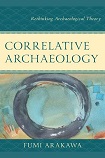In Correlative Archaeology, Fumi Arakawa applies correlative thinking practices, which are derived from an East Asian view of the world that stresses connectivity, to archaeological interpretations. Arakawa, a Japanese scholar who was trained in Western archaeology, argues that a correlative paradigm can help archaeologists, as well as scholars and researchers from other disciplines, consider competing paradigms and integrate Native American voices and narratives into interpretations of prehistoric art and landscapes.
By complicating the history of portraiture in Senegal, The Future Is in Your Hands reveals the enduring power of images and the efforts under way to keep this art form safely in Senegalese hands.

 The College of Arts
The College of Arts